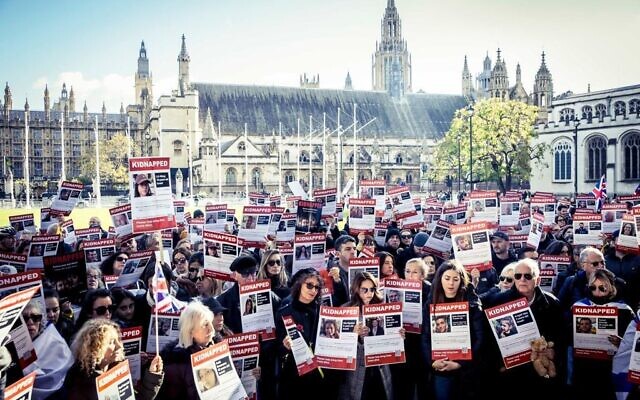OPINION: Terrifying realities of Israel’s plight reach our front door
A former managing editor of Jewish News reflects on a month of concern for his teenage son in Israel and the chilling impact of the conflict on British Jews
On 7 October, we arrived at a friend’s house for lunch to mark the end of Succot – where we remember when our ancestors wandered in the desert after being freed from slavery in Egypt.
“Israel is at war.” That’s the greeting we received. All three families gathered had teenage sons in Israel on gap-year programmes.
I ran home to get my phone. Breaking the Sabbath and frantically dialling my son’s number. No reply. We had to wait hours before we could eventually speak. He’d been in a bomb shelter for the majority of that day. Unfortunately, something Israelis know only too well. But a very new experience for us.
The terror of what we saw unfold that day in Israel was indescribable. The horrific reality of the 7 October massacre, and some 240-plus hostages taken by Hamas, slowly sank in. And that night, we watched the TV bewildered as scenes of people in some Arab countries celebrated these atrocities by dancing in the streets.
Just 24 hours later, we received a WhatsApp message from Sammy. “Don’t call me. Hiding under a table. Siren just went off. Don’t know what’s happening. Lots of soldiers in our area.”
The perimeter alarm at his kibbutz in the Gush had been triggered. They were surrounded by armed guards, many kids terrified. Some in tears. It was an hour before the all-clear came. During that time, I could barely breathe.
Sammy’s gap year programme is a mix of international and Israeli teens. It’s called ‘mechina’ – preparation for adulthood. Next year, Sammy will go to university in Leeds. While the Israelis he is with, at just 18, will be heading into the army. Kids trying to ensure there is just one safe place in the world that Jews can call their home.
Sammy’s programme was paused for a week as all his madrichim (leaders) were called up. My wife had to contact an old B’nei Akiva WhatsApp group to find someone to come and collect him from the West Bank. A friend she hadn’t spoken to for 25 years answered the SOS – they themselves with kids already drafted to serve on the front line. They opened their doors to Sammy without hesitation.
The perimeter alarm at my son’s kibbutz had been triggered. They were surrounded by armed guards, many kids terrified. Some in tears. It was an hour before the all-clear came. During that time, I could barely breathe.
After a few days a family who had been evacuated from Ashkelon arrived at the house. We got a call that maybe Sammy might need to move on. And it was then we made the difficult decision to bring him home.
He rightly challenged us: “But one day if I want to live here, I won’t be able to just leave.” But we were terrified. We couldn’t sleep or eat. And what we experienced was nothing compared to what Israeli families were going through. My wife’s friend here in the UK still doesn’t know the fate of one of their close Israeli relatives. A child. Still missing since 7 October.
Around the world, we now see baseless hatred towards Jews everywhere we turn. At anti-Israel rallies on UK streets where people are shouting for jihad. A cemetery in Vienna daubed with swastikas and burnt. A woman stabbed in Paris. Threats made against Jewish students on US college campuses. People calling for a boycott M&S’ Xmas campaign because it contains the colours red and green.
Whatever happens in Israel always impacts world-Jewry. There’s even talk of people we know hiding their Jewish identity. Everyone is drained. Everyone is scared.
But this is a fear, as Jews, we have to live with. I experienced antisemitism in my first job as a trainee reporter. My dad experienced it at his school in north London where Jews were routinely beaten up.
My great grandparents fled Poland and Austria to find safety in the UK before the Holocaust. Their parents fled Russia and the horrors of the pogroms. The Spanish Inquisition and the Crusades – the choice for Jews: forced conversion or death. Even in England, in 1290, the entire Jewish population was expelled by Edward I.
Before that our first temple was destroyed by the Babylonians in 586 BCE. The Romans then destroyed our second temple over 400 years later. Murdering Jews and forcing us into exile. A pattern repeated throughout our history.
In 1948, 1967 and 1973 Israel was surrounded by nation states that wanted to wipe it off the face of the earth. Today, Hamas, Hezbollah, the Houthi rebels in Yemen, ISIS and Iran are no different.
We cannot and should never again have to hide who we are and what we believe in. In 2002, I wrote a front page for the Jewish News, as it’s managing editor, calling for people to ‘Stand up for Israel’.
I said: “Politically isolated and economically battered, Israel is fighting for her survival. Her citizens have never felt so alone, while across Europe antisemitism has reached a shocking and frightening new level.”
More than 20 years later that rallying cry has never been more important.
In 1948, 1967 and 1973 Israel was surrounded by nation states that wanted to wipe it off the face of the earth. Today, Hamas, Hezbollah, the Houthi rebels in Yemen, ISIS and Iran are no different.
We pray for peace. We believe all life is sacred. Palestinian and Israeli. But as Golda Meir, Israel’s first female Prime Minister said in 1973, “We have nowhere else to go”.
We have to stand with Israel. To support the country in its time of need in any way we can. While we may not be able to physically fight we can join rallies. We can call for the safe return of all hostages. We can sign petitions. We can volunteer. We can support those fighting the social media battles every day against vile anti-Israel and anti-Jewish hatred. We can fight the conscious bias of the BBC or Sky News.
We need to stand together to show all those serving on the front line in Gaza and the Lebanese border that we have their backs.
As for Sammy, we are now chatting about when he will return in a few weeks. Like many gap year kids that returned to the UK, he wants to be back in Israel, helping in any way he can.

Thank you for helping to make Jewish News the leading source of news and opinion for the UK Jewish community. Today we're asking for your invaluable help to continue putting our community first in everything we do.
For as little as £5 a month you can help sustain the vital work we do in celebrating and standing up for Jewish life in Britain.
Jewish News holds our community together and keeps us connected. Like a synagogue, it’s where people turn to feel part of something bigger. It also proudly shows the rest of Britain the vibrancy and rich culture of modern Jewish life.
You can make a quick and easy one-off or monthly contribution of £5, £10, £20 or any other sum you’re comfortable with.
100% of your donation will help us continue celebrating our community, in all its dynamic diversity...
Engaging
Being a community platform means so much more than producing a newspaper and website. One of our proudest roles is media partnering with our invaluable charities to amplify the outstanding work they do to help us all.
Celebrating
There’s no shortage of oys in the world but Jewish News takes every opportunity to celebrate the joys too, through projects like Night of Heroes, 40 Under 40 and other compelling countdowns that make the community kvell with pride.
Pioneering
In the first collaboration between media outlets from different faiths, Jewish News worked with British Muslim TV and Church Times to produce a list of young activists leading the way on interfaith understanding.
Campaigning
Royal Mail issued a stamp honouring Holocaust hero Sir Nicholas Winton after a Jewish News campaign attracted more than 100,000 backers. Jewish Newsalso produces special editions of the paper highlighting pressing issues including mental health and Holocaust remembrance.
Easy access
In an age when news is readily accessible, Jewish News provides high-quality content free online and offline, removing any financial barriers to connecting people.
Voice of our community to wider society
The Jewish News team regularly appears on TV, radio and on the pages of the national press to comment on stories about the Jewish community. Easy access to the paper on the streets of London also means Jewish News provides an invaluable window into the community for the country at large.
We hope you agree all this is worth preserving.






















